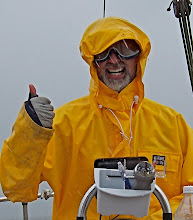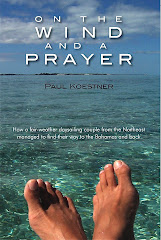
Where to next, Cap?
Sailors are said to be a restless lot, which is a fairly encompassing statement. Like vegetables are good for you. I’ve since discovered that corn has no food value whatsoever, and I’m predicting that the whole nutritional house of cards will soon come tumbling down, which is why I’m stocking up on Twinkies. Or Germans are precision-obsessed. All my ancestors hail from Deutschland, and I’m scatterbrained as an Irish Setter. The warplanes I manufactured as a child in my bedroom facility were hasty amalgams of ill-mated plasticine parts and overzealous decal jobs. I pity the pilots cemented inside those fuselages. The adhesive, though, sure did smell good.
I suppose by definition sailors are generally in a state of motion. But then so are shoppers. I find myself not so much restless as antsy. Ants in the pants, Mom would say. “What have you got? Ants in your pants?" Well I didn’t know. I hoped not. Maybe it was the carpet pile I was allergic to.
My brother John, now that boy had ants in his pants. He was considerably younger than me on the Beaufort Scale, but the kid got around. I was content to stay in the yard, and maybe climb a tree. We had a polka dot play box chock full of anything I might need to get me through the day. There were blocks in there and, what else? Blocks was about it, and that was good enough for me.
As I matured I migrated to Estes rockets, but again would never bother to travel to a potential launch site with suitable open range. I’d set them off in the back yard as soon as I’d cobbled them together, doing my best to account for prevailing winds when plotting a trajectory that would hopefully bring the astro-cricket safely back home. I rarely got more than one flight out of each of my rockets, and I’m pretty sure they traveled farther out of the neighborhood than I ever did.
John needed room to roam, and he did it on his ridiculous Schwinn Stingray, with its wacky handlebars and banana seat. I can see him in my mind’s eye, tacking down the road, peddling like a banshee, four times faster than a normal kid would have to peddle on a normal bike. John was definitely not normal, but he got out and saw the world.
If I had three local friends, John had thirty. One of mine, John Marietta, always came over to our house because I was allergic to his cats. My brother and I shared John Marietta as a friend. I have a feeling the two of them had more fun when I wasn’t around, which is to say when they weren’t at our house. When they came back from somewhere else they usually smelled weird, and they’d hint at stuff they’d done that maybe they shouldn’t have. Then came the exotic name-dropping from far-off lands. Who the hell were the Hoekstras, and where in hell was Millwood?
After we’d grown up, John would continue to mention other people and places as if I’d taken the mandatory college course in childhood history. “Remember Bruce Tomlinson? When he got bit by that bee and swelled up? Lived over on Meadowbrook? Off Inkster? Next to the Hoekstras. Kim Hoekstra was a knockout.” It might as well have been Greece he’d visited, on a trip to woo Aphrodite.
John grew up and has over time owned about every aquatic vessel imaginable, short of a submarine. I imagine if I ever see a periscope poking up off of South Haven’s shore on Lake Michigan, that’ll be John, checking out the distaff population. John is a real boater.
I’ve always been pretty much fine right where I was at the time. Give me a cinderblock bunker in a PCB-laced minefield with my name on the mail slot, and I’m lord of the mansion. This was so for the fifteen-plus years I inhabited a shitbox in Manhattan’s East Village. I took the apartment before I saw the place, so happy was I that someone would allow me to sign a lease agreement on a space I could almost afford.
The apartment was three hundred square feet, about as wide as my arm span, on the first floor of a crumbling tenement. With barely enough room for me, it had at one time housed an entire family. I know this because I showed my place to an old woman who had once lived in the apartment one flight above. She'd discovered me lounging on our building's stoop while she was engaged in her own sentimental journey, and she related how she'd chat through the fire escape with her best friend living a floor below her.
As my apartment faced north, its gated window allowed virtually no penetrating natural light. And since passersby could peek in on me from the sidewalk, I further insulated myself with a diffusion panel so no one could gawk at the squalor in which I’d become comfortably ensconced. It was worse than living on a boat.
In the early years before gentrification (such an abomination!) I often had to step over what I could only hope was a resting person in order to get into my building. Had I been a mammal on display at the zoo I would have had scores of animal rights activists petitioning for my release.
The poet Emily Dickenson, who is said never to have ventured off the grounds of her childhood home, argued for the superior form of travel afforded by one’s imagination in the poem “I Never Saw A Moor”:
I never saw a Moor --
I never saw the Sea --
Yet know I how the Heather looks
And what a Billow be.
Emily loses me in the second stanza, and I'm sure she wouldn't have impressed any wanderlusting sailor in her first. In any event, I’ve been around the world some, and have had many eye-opening and nose-stifling experiences. Still, I’m convinced I will end up missing most of the solar system’s hot spots, and that does not bother me much.
The only lusting I experience is usually done in a relatively stationary position. When I have traveled any significant distance in life, it is because someone else has made me do it. I’d be living in Michigan right now if I hadn’t been accepted to school in New York City. School, at that age, is all one knows, and since I’d been accepted there, I went. Simple as that.
This is why I’m always correcting people about the boat trip. “Man,” they say, “how did you get Deb to do it? That must’ve been a hard sell.” And it was, for her. She was the one bugging me to go.
What I am is a follower. I like being the enthusiastic accomplice to someone else’s dream. I have little self-motivation, but as soon as someone else makes wistful mention of a pet project, I go to town like Mickey Rooney drooling over Judy Garland, on the list of things we’ll want. “Yeah, this is do-able! We’re just gonna need a Sawzall, an eleven sixteenth's Forstner bit, and maybe three tubes of 5200…”
That’s my attitude when the project seems a necessary one to somebody else. Make it my personal project, and the list I’m penning is entitled “Why This Idea Is One Big Boondoggle Waiting To Blow Up In Our Faces.” That list will begin and end with the first item, usually the requirement that some surface needs to be sanded.
Deb tore my first list up, and we started over. One of the things on the new list was Learn Morse Code. That ended up a strategic waste of time, but the kind of waste of time that helped convince us we could do just about anything, if we put our minds to it.

The author, putting his mind to work on the next post














